How Facebook Is Like The Mirror Of Erised
My sister-in-law Susan said this on Facebook:
“So you know that delicious-looking recipe all over FB with the crescent rolls and chocolate chips?”
No.
No, I didn’t.
I have never seen a recipe on Facebook in my life.
I’ve seen penis cakes, and turduckopiggens, and elaborate food-sculptures weaved of cooked bacon, but I cannot recall seeing an actual recipe on Facebook ever. Let alone this universal crescent roll with chocolate chips that seems delicious, but according to Sue even the dog wouldn’t eat it.
Yet that’s Sue’s experience: recipes. She doesn’t even bat an eye at indicating that a recipe is all over Facebook, which if I noted it, I’d say, “Odd that I’m getting recipes in Facebook now.” Which indicates that to Sue, recipes are all over her Facebook – maybe not as common as selfies, but a thing that crops up regularly.
Which is the terrifying thing about social media, really. In the distant past, we had a handful of newspapers and three channels to watch the news on. And the news was narrow, so narrow that whatever stories didn’t make it into those informational gateways might as well not have existed, but you knew what when you watched CBS, you were seeing the same Walter Cronkite story that the rest of America was watching.
Now, in social media – most prevalent on Facebook, with its algorithms that choose what’s of interest for you, but you can self-select to your liking on Twitter and Tumblr and Google+ – you can see an entirely different world, and never notice it.
To someone, Facebook is a place filled with recipes and cleaning tips and advice columns. To someone else, Facebook is a welter of lamentations that their sportsball team lost, car photos, bawdy jokes and pin-up girls. And to me, Facebook is a place of XKCD cartoons and cat macros and scientific breakthroughs.
And they’re all the same site.
I don’t know how many people realize that Facebook is such a customizable experience that each person sees a radically different thing. I know a lot of people are confused when they posted something vitally important on Facebook – a death in the family, a graduation, a book sale – and I didn’t see it. They’d assumed that if we were friends, and they posted something, I saw it. So if my technologically-adept friends often don’t understand that Facebook doesn’t show their posts to everyone, how many of the general population understands?
And I think this effect is weirdly insidious. It’s been shaping politics for years, an echo chamber kicked off by Fox News, and slowly everyone is being fitted for their customized bubble. Everyone I know has heard of this latest sexist outrage in science-fiction… but quite literally, I may be in touch with all the people who know and care about it. Yet to me, it seems huge, and there’s no easy way of objectively correlating it. I don’t have easy access to web traffic (“This blog post you see as universally-seen has received 3,000 hits”), or statistics showing me how much of an outlier I am, or any of that.
Yet every morning, logging into the Internet, I am presented with a world. A world that is, and continues to be, radically different from other people’s experience. And that world shapes my reactions in ugly ways. If everyone I know and see is calmly discussing Obamacare as though it’s a universal good, then I begin to think “Well, everyone believes this,” and a) my urgency in fighting for these causes lessens because I think it’s handled, and b) I get outraged and threatened more when I see someone attacking Obamacare (“Why is this person so unreasonable when everyone else understands its goodness?”), and c) my facts are skewed. I am acting according to a customized illusion of the world presented to me not as the world exists, but according to what algorithms inside some server think would comfort and entertain me.
That’s a terrifying thought. And yes, you can fight that bubble fairly easily, by broadening your news sources or having some friends in the opposition or just doing more Google searches. Yet my point is that the bubble is enclosed around you transparently, without any warning of “DANGER: Opinions in this zone have been tailored to reflect your biases,” and if you’re not observant then you can wind up looking into a hall of mirrors.
Somewhere, there’s a person for whom Facebook has no politics; it is just recipes and kid pictures, a serene place because its owner wants nothing to do with conflict or debate. In that same web page, there’s a person for whom Facebook is a continual stream of conservative cheerleading, a steady stream of triumphs of individual gumption. In that same web page, there’s a person for whom the Trayvon Martin case was such a slam-dunk that it was clear to her that Zimmerman would be prosecuted, because she’d read fifty articles showing exactly how clear-cut this case was. And to that person, Trayvon Martin’s case had to be the result of jury tampering or corruption.
None of them know they’re seeing different worlds. All of them may be acting as though this was a universal world. To them, Facebook is Walter Cronkite the news announcer, bringing them the day’s events, but Walter is whispering a different thing to each of you.
And slowly, surely, we all begin to drift out of touch.
Things Dogs Don't Understand
She still walks around like she’s hobbled, looking up at us with a deep and aggrieved confusion.
A Small Restriction, Nothing More
Last January, after my heart surgery, walking outside in the cold air was like breathing knives. Like broken ribs. My chest constricted, giving me an instant asthma attack – but unlike asthma attacks, which are panic-inducing but not hurtful, the chill air ate into my lungs, dug at my ribs.
But what did that matter? My legs were also numb after my surgery, the result of several major nerves being rudely jangled. I was weakened by the trauma, could barely walk. Surely all of this would go away.
Except, as I found last night when I went to take Shasta for a walk, this hadn’t.
I had to stop halfway down the street, snow skirling about me, and calm myself as my breath came in short hitches. The high winds weren’t helping, but that old familiar pain was back.
Now I have to prepare for it.
As Gini noted, I now need a scarf. I’ve never needed scarfs. Hell, I’ve never needed much in the way of winter outfits to begin with, as my innate cold resistance used to let me go for long walks in the snow wearing nothing but a T-shirt and jeans. But I need to have something thick to breathe through, just in case the cold becomes too much for me.
It’s a little death. Nothing too big. Just another lifestyle change to add to the pile. And considering I have friends going through life-threatening turmoil, battling cancer and other ailments in attempts to keep breathing, “a scarf” is a pretty small thing.
Yet the one thing my triple bypass gave me was a window to the end. I remember being trapped in a chair, too weak to move, my body unable to comply with my mind’s kind requests. I remember pissing into a cup because I could not get up. I remember drifting off because even the act of talking for half an hour was so strenuous that my body switched itself off like a circuit-breaker. And I’ve recovered, but I know that one day I will degrade; there is a nursing home with my name on it, a wheelchair I will be pent to, and I got a bitter taste of it.
The scarf is not a scarf. It is a step down that road.
It’s a long road, yet. I have probably thirty, maybe forty years of good existence left in me. I intend to write a lot of stories, grab all the snuggles, have all the laughs. Seeing the end goal is not a cause for despair; I have so many years left, and that finish line tells me I’d better make each one count. So with hard work and hard play, I maximize what I can do.
Yet there is a chill wind outside. Winter is coming. Decrepitude is coming.
Life is leaving, slowly leaving, as it always is. But sometimes you feel its ebb a little more keenly.
A Brief Thought On Dream Sequences In Books
I generally don’t like dream sequences in books, because they’re often one of two dislikable things:
1) A fake horror. “Oh, let’s have you struggle to get invested in something weird you think is happening, and then tell you that it was all a dream!” I know, I know, you think you’re delivering mood and information, but realistically since dreams are dense and bizarre and jarring, we’ve usually just wasted energy parsing something that turns out to be forgotten instantly upon awaking, “As dreams do.” Which teaches the reader an unfortunate lesson: Don’t get too attached to anything, as portions of this book might turn out to not matter.
2) A lazy plot device. The protagonist falls asleep, and information is delivered to him via dream or psychic flash or mystical sending from the beyond or whatever. Which is a deus ex machina, a way for the plot to hand your lead the next goal to find, as opposed to the protagonist seeking it.
I understand why you do it. That’s usually the author’s excuse for “I can’t think of a way the character would otherwise run across this chunk of much-needed backstory, so she’ll dream about it, wandering to the misty realms of flashback!” I’ve done that, when I had no choice. But it’s far better to engineer some way that your lead character actively stumbles across this information, which teaches us that the character can do something more interesting than “falling asleep.” Because, as Pixar said, “Coincidences to get characters into trouble are great; coincidences to get them out of it are cheating.”
Now, there’s a third style of dream in fiction, which I do like, which is dream as foreshadowing: think of Danny in The Shining, dreaming of Redrum and mallets and terrible things stalking him down halls, all of which turn out to be true. But in that case, the information matters, and in fact becomes a reference point. But in general, I find most fictiony dreams to be a misstep, and usually a waste of time.
My Trip To Film Mecca: The Alamo Drafthouse
The Alamo Drafthouse Movie Theater first came to my attention when they replayed a woman’s outraged, profanity-filled voicemail where she was pissy over getting kicked out for texting in their theater. She said she was telling all her friends what a rip-off this place was, and is never coming back. And their reaction was, “Thanks for not coming back, texter!”
That’s when I fell in love.
But I continued to hear about the Alamo Drafthouse as being a Mecca for movie lovers – classic movies played alongside the latest SFX extravaganzas, good food, a culture that loved movies – and when I found out one was opening up in Kalamazoo, Michigan, I wanted to go. It was five hours away. Fortunately, my friend Angie a) lives in Michigan and b) is every bit as crazy as I am, so we planned a weekend to go to their soft opening.
I was impressed days before I even got to the theater. We wanted to see The Shining on the big screen, and tried to order through their web site, but their website was acting wonky (which isn’t helped by the fact that, unlike most theaters, the Alamo has reserved seats). The Shining, we eventually discovered, was sold out – as was Singin’ in the Rain, our next choice. But thanks to the web site glitches, we weren’t sure whether both shows were genuinely sold out or just some error. So I called, and the guy at the box office told me that indeed, both shows were sold out.
“But,” he said. “If you liked Singin’ in the Rain, we’re showing a great indie documentary: A Band Called Death. It’s about a black punk band in the 1970s, and it is awesome.”
Think about that. How often does a clerk try to sell you tickets to another movie? That’s a straight-up record store move: “Yeah, we’re out of Led Zeppelin, but have you heard this band?”
And what a ballsy goddamned move! “You liked a 1940s musical – so clearly, you’ll love a documentary about a black punk band!” It was so goddamned audacious, I went for it. So I’d drive five hours to see a movie I’d never heard of on the recommendation of a total stranger! Why the hell not?
So we got there, and the theater was imposingly big. I love the sign, which is colorful and art deco and looming:
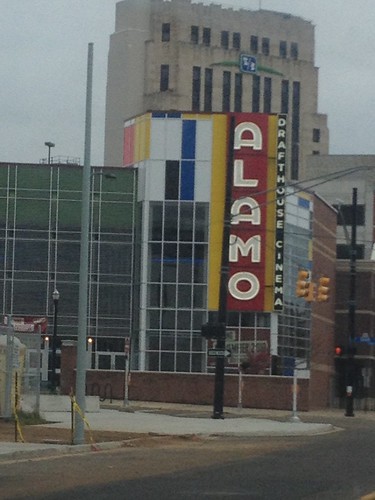
The interior of the lobby is nice and roomy and well-lit. There are a lot of theaters that are big on the inside, but the spaces in between the theaters feel like rats’ mazes. The Alamo Drafthouse has a wide space, making it feel comfortable, like you’re all gathering together for something pleasant instead of being jammed into an airport:
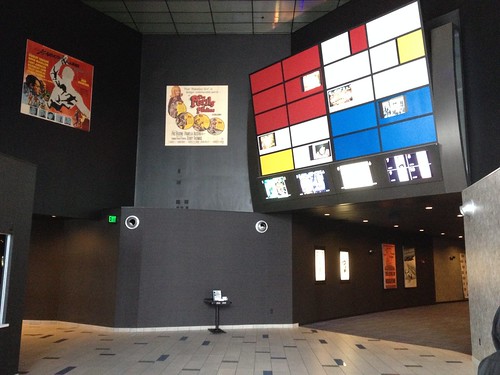

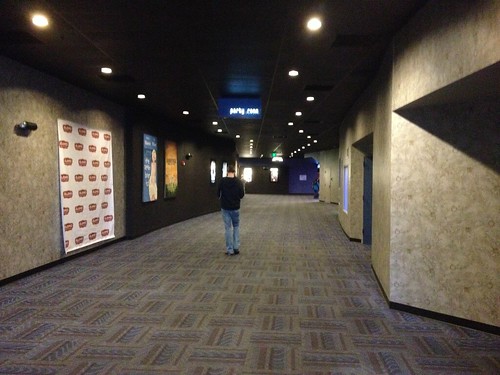
There were also funny posters, touting their food:
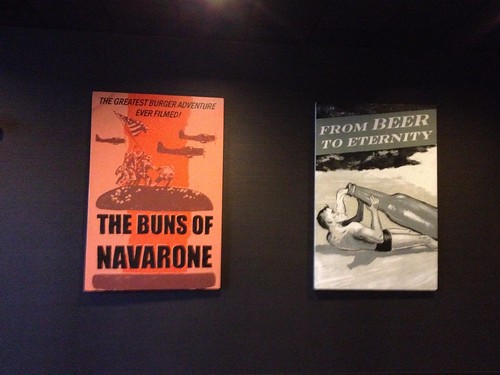
And a weirdly out-of-place-but-perfectly-fitting tribute to Barbarella, complete with Jane Fonda mannequin – which isn’t a great film but I was oddly glad to see it here:
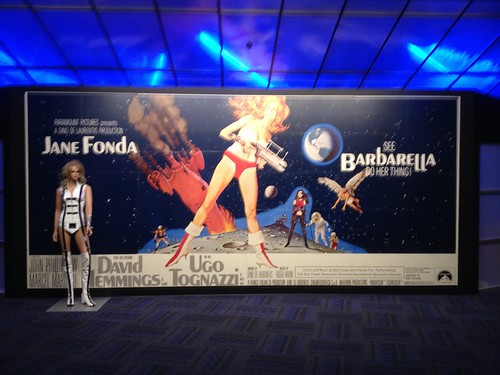
As for the theater, it was really quite cozy. The seats aren’t as comfortable as some of the recliners in the local AMC theaters here, but they do feature a long shelf in front of you, complete with a slot for a menu, and a pad and paper. You can scribble your menu order on the paper, and tuck it in the railing, and waitresses will sneak along like ninjas – seriously, they crouch and pad – to snatch up the papers and take your order. Halfway through the film, your food arrives.
The food was really, really good. Like, objectively good. I would have ordered their chicken-and-pesto sandwich at any diner. Plus, they had adult milkshakes (I had one with Kahlua and chili powder), and warm cookies. And though I’ve eaten in other theater-and-eater combos before, it’s always kind of a thrill to have a bowl of popcorn brought to you in the middle of a show.
(I have long wanted to see the twelve-hour “You eat when they do!” Lord of the Rings movie marathon, where they feed you exactly what the people on-screen are eating at any given time. I hear you are totally full by the end of Fellowship, but Return of the King gets a bit tummy-growly.)
(Angie also yelled at me because, after the movie was over, I stole a handful of popcorn from the bowl of some people who’d left it behind. Hey, I wanted to see what their popcorn tasted like! It was pretty good.)
And of course, the menu has this Pulp Fiction beauty, which made me realize I was in the right place:
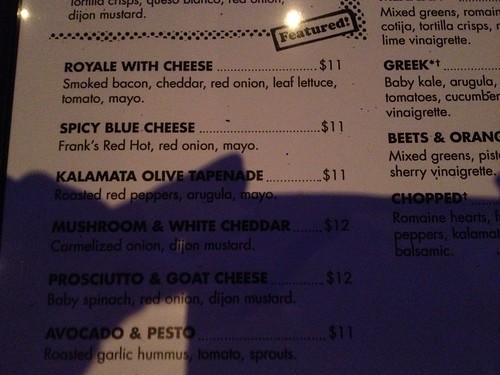
The film itself was pretty amazing. It was A Band Called Death, which I will point out is available on Netflix Streaming. The elevator pitch is that in 1973, in Detroit, three black brothers created punk music about four years before the rest of the world did. And nobody knew about them, because a) they were in a town where black guys were expected to do Motown, b) the sound was so psychotic that it was hard to find an audience for it, and c) they called themselves “Death,” which did not go over well in the 1970s.
Like any good documentary, the less I tell you about this, the more impact it’ll have. But you don’t even have to like punk music all that much to get blown away by this; it’s not just one of my favorite documentaries of all time, ranking up there with The King of Kong and Spellbound, but it’s one of my favorite films of the year. So check it out.
Good work, box office suggesting guy.
After the show was over, I was a total drooling convert. I’m actually really sad we don’t have one in Cleveland, because I’d probably be going at least twice a month, if not more. I tracked down the manager and asked him, “What do we have to do to get one in my home town?” – as Cleveland has a hell of a lot of film festivals, and its locals are rabid movie lovers – but he didn’t really give me an answer. A shame. I would honestly pull all of the funds out of my 401ks and become a backer for this if it would help, but obviously making a theater this big costs millions of dollars.
And I don’t know what demographics they’re shooting for. I know Borders Books, back in the day when they were smart, pinpointed towns with a) no large-scale bookstores that b) had large segments of college-educated people. Which got them phenomenally successful stores. One suspects Alamo Drafthouse is expanding slowly, to avoid straining the finances, and are choosing each theater’s locale very carefully in order to ensure that each one is a titan. It may be that Cleveland has too much competition, which would explain why they opened up in Kalamazoo instead of Ann Arbor, which is a bigger college town that also has a couple of really notable indie theaters.
But if there is a way to make it happen, Alamo, you email me. I’ll do what I can. Because I am totally in love with you.

